In Frankfurt, young men and women battle through the bustling, crowded streets of one of Germany’s central hubs. Whether visiting the Goethe House Museum or enjoying a weisse bier on the banks of the river Main, the home of the European Central Bank was famed for its culture – not its chaos. Despite the city’s post-war resurgence, destruction could still be heard, sounding off in twos and threes, with creaking, swinging chains and the pounding of a leather heavy bag.
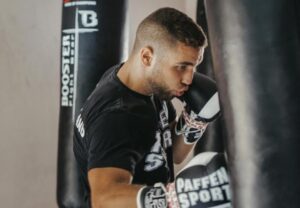
Boxing wasn’t Germany’s first love. Following the decline of millennial fighters Felix Sturm, Jürgen Braehmer, Robert Stieglitz and Arthur Abraham, those big stadium bouts had become extinct, instead relying on young talent such as Abass Baraou and Sophie Alisch to ignite a fading, fickle sport. However, after capturing his maiden professional title, one man was preparing for an assault on the light-heavyweight division, splitting his time between Frankfurt and Berlin.
Undefeated twenty-six year old, Leon Bunn (14-0, 8KOs) had gone about his business expertly, stealthily establishing himself amongst the top contenders in one of the sport’s most convoluted divisions. When speaking to Bunn, exclusively for Boxing Social, he detailed an introduction to boxing and a continuing common theme – family.
“I started with different martial arts. I started kickboxing when I was about eight years old, I think. My father was a kickboxer and I looked up to him. I watched his fights and when I was a kid, I just said, ‘I want to be the strongest man in the world – like him’. From ten years old, I started with boxing. I had my first fight at twelve, but it was all because of my father. He was a martial artist and then I fell in love with boxing.”
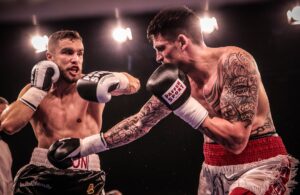
Bunn continued, “I had a really lovely childhood, because my parents both supported me in my sport. In my teenage years, things got a bit harder for me because I wanted to finish high school, that was important for my parents. I had to focus on boxing and doing both wasn’t easy. You’re maybe distracted sometimes and you want to go out with your friends, partying and stuff like that.”
After escaping the lure of adolescence, Bunn focused himself solely on achieving world honours. As he begins to clamber up the rankings of most governing bodies, the toughest tests are yet to come. However, it was clear from our discussion that he was dedicated, something easier said than done with an always gruelling schedule.
Now splitting his camp between work with his father in Frankfurt and legendary German trainer, Ulli Wegner, in Berlin, he was open to expanding his arsenal. Working closely with Team Sauerland, Bunn had snatched the IBF International light-heavyweight strap, a token gesture for a man breaking into the top fifteen. Adding that striking red accessory to his trophy cabinet filled the Frankfurt man with pride, but it wasn’t international titles he’d dreamed of, all those years ago.
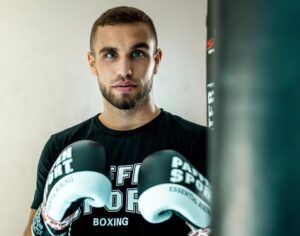
“When I am in Frankfurt, my father trains me and when I’m training in Berlin about six or seven weeks before fights, I train with Ulli Wegner. My father is always by my side. We talk to each other and we improve together. We talk about boxing and for me this is very important. Ulli Wegner has so much experience. You can learn from any trainer, but I listen to everything he says and I just try to bring my best to his training [sessions]. With my father, it’s a lot of pads, but with Wegner, he will watch from the outside and tell me this or that. Both parts [of camp] are very important for me.”
The recent surge in domestic talent has been music to the ears of family-centric company, Team Sauerland, now headed up primarily by one of the sons/brothers, Nisse Sauerland. Their dominance across many parts of Europe looks set to continue, with talent such as Bunn becoming more familiar to their target audience. Team Sauerland are hoping for big things with their light-heavyweight charge, a former amateur standout – such is their recruitment policy.
Leon shed some light, telling me, “My biggest success as an amateur, was the Chemistry Cup, which is a big tournament in Germany. Cuban fighters often come there, Russian fighters and UK fighters. It’s a big tournament and I won it. I was German champion and I was actually the champion two times. I also fought internationally, but I never fought in the European Championships or World Championships because there was another guy in front of me – even though I beat him in other championships.”
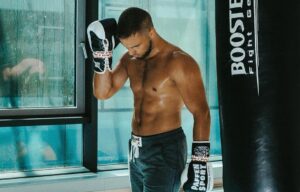
“I think they [Team Sauerland] called me. It was in 2016, they called me and asked me about my amateur career and if I was interested in becoming a pro. I was very interested. I said from an early age, I want to improve as an amateur because you need that experience for turning pro. I think then, it was the right time.
“It feels really good, to be honest. I’m very honoured that Sauerland has so much trust in me and they give me a lot of support. From childhood on, it was my dream to be a great fighter and I want to achieve great, great things. Team Sauerland are an excellent team and it’s a big honour for me.”
In beating Leon Harth at the beginning of May, Bunn had seemingly passed the point of no return. Those learning fights, beating men who’d been sent to educate him, were a thing of the past with future opponents on a mission to defeat the Frankfurt native. It was time to step up and Leon explained his hopes for a big show towards the end of the year where he’d face a tougher opponent for an additional title, yet to be confirmed.
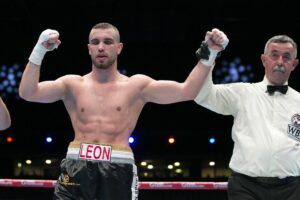
The landscape at 175lbs is cluttered, with four champions and a host of hungry, capable challengers. The IBF, a division in which Bunn is highly ranked, is currently ruled by Russian destroyer, Artur Beterbiev. The reigning champion is the only man clutching a world title to possess a 100% knockout ratio – not something to be sniffed at.
With one of the UK’s hottest prospects tipped to face the recently resurrected WBO champion, Sergey Kovalev, a change at the top wasn’t out with the realms of possibility. Honourable mentions for Dmitry Bivol and Oleksandr Gvozdyk, both light-heavyweight world champions in their own right and perhaps the two freshest of those at the peak of their powers.
“I think Artur Beterbiev is very dangerous. When you fight him, you have to be awake for the whole fight. You have to concentrate. He is a very hard hitter but he is a little bit older now and he maybe doesn’t have much time left. In his second last fight, he fought Callum Johnson and he wasn’t so impressive. He went down. I think he has some holes in his game, but he’s a great fighter and you have to be prepared. The timing has to be right.”
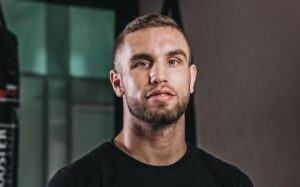
“I think also, like Beterbiev, [Sergey] Kovalev is getting a bit older now. There’s a chance for Anthony Yarde – but this is very difficult. Kovalev is still a great champion and he has so much experience. It will be really interesting and I can’t really say, to be honest. Maybe a little bit, I would favour Kovalev, but we will see. It’s an interesting one for me, too.”
During my time with Leon, there was no hint of trepidation. He was a fighter, after all. Whether it was Beterbiev, Kovalev or another champion at the time of asking, he would step through the ropes confident of victory. Yet, when asked what he’d found the toughest part of life as a professional boxer, he became incredibly honest and, at times, vulnerable. Refreshingly, he spoke words that many fighters refuse to – boxing is stressful and its participants need support from those around them.
“It was my dream from childhood and I’m so pleased I can live this life, but the hardest part is before the fights. About a week before the fight, there’s pressure on your shoulders. You live your dream, but you want to perform very well. It’s not that I’m scared, I just have [visions of these] big achievements in my head. You have to keep calm and this is the biggest challenge in this sport.
“I like pressure on my shoulders, too. But you have to learn to deal with it. I try to train my head. I read good books and it helps when I pray to God. This calms me down. Don’t think negative – that’s very important. Focus on what you have to do and how you want to fight, not what could go wrong.”
Interview written by: Craig Scott
Follow Craig on Twitter at: @craigscott209